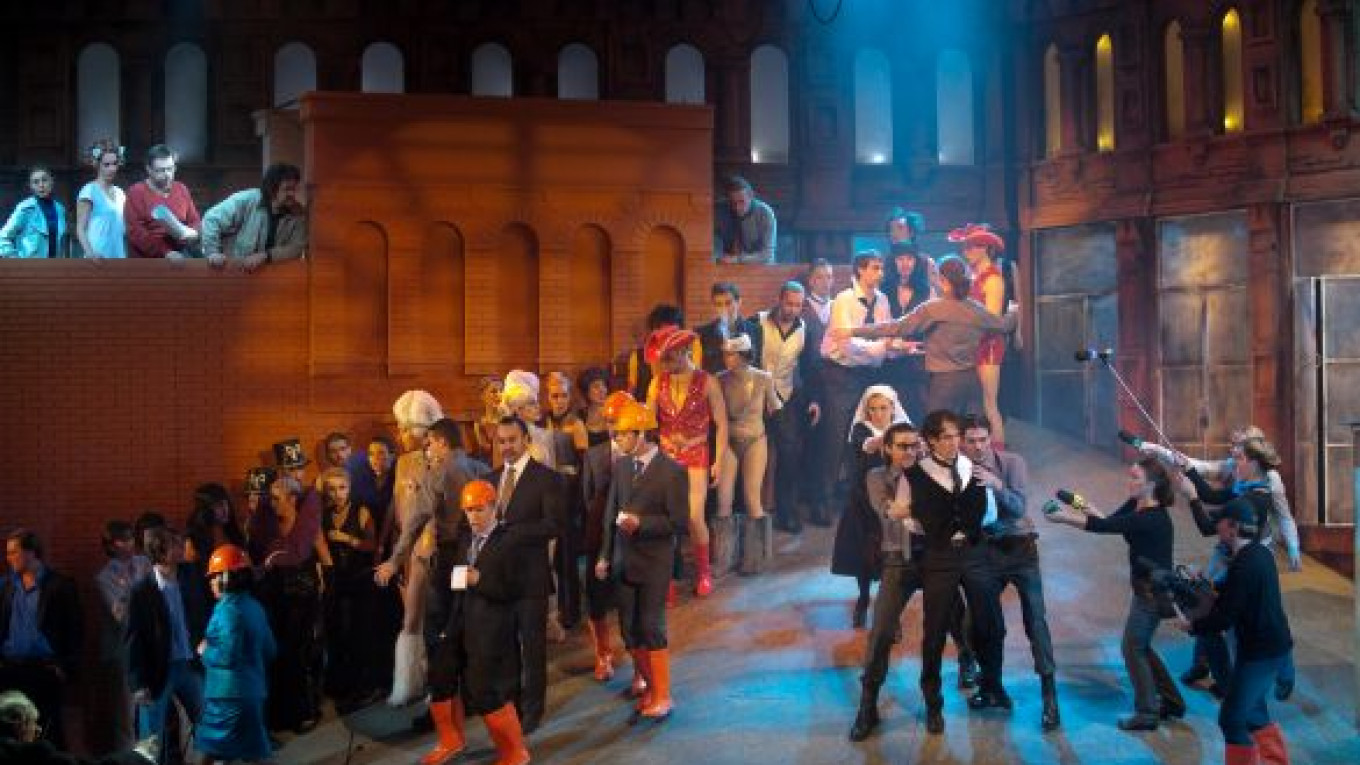As the curtain came up for the first time at the Bolshoi on Friday, viewers saw a satirical take on the theater’s endless renovation, with the Bolshoi choir dressed as construction workers, as if still rushing to get the stage ready in time. Across town, on the same night, another opera theater premiered its own construction-themed work, with the Helikon’s pointed take on Richard Wagner’s early opera, “Das Liebesverbot” (The Ban on Love).
This is not Wagner as we know it. Absent are the anguished heroes, the epic quests and the mythical subtext. Instead, “Das Liebesverbot,” written when the composer was just 22 and largely ignored ever since, is a pleasant, somewhat silly comedy that at times verges on pantomime. The opera is set in Sicily, where the king’s vassal, Friedrich, bans carnivals, wine and love itself, much to the distress of the locals, who enjoy their reveling.
The Helikon’s Dmitry Bertman resets the action in contemporary Moscow, in the courtyard of the Helikon’s traditional home on Bolshaya Nikitskaya, and gives the cheerful plot a cutting edge. This season would have been the first inside the renovated theater if the arguments over the renovations hadn’t slowed things down and even put the theater’s new home in doubt, keeping it in its miserable, poky hall on the second floor of a former government building on Novy Arbat. It seems to be Bertman’s bitter joke that in a way, at least, the theater is indeed kicking off the season at Bolshaya Nikitskaya, even if it’s only at an on-stage replica of the building.
Conductor Konstantin Chudovsky kicked things off in the orchestral pit by wielding an electric drill, switching it on and off to lay down the opening rhythm before the orchestra struck up the boisterous overture. Friedrich’s supporters in this production are overzealous architectural preservationists, who are keen to outlaw all the fun and carnival provided by an extravagantly dressed theater troupe. An officious band of busybodies, the preservationists scuttle around the stage taking photographs, measuring walls with tape measures, and perusing detailed architectural plans with smug concern. The king’s vassal, Friedrich, when he appears, is a pompous official from City Hall, surrounded by faceless suited minions and followed around by a television crew that films what he orders them to.
It may seem that there are a great many aspects of contemporary Moscow that deserve to be satirized over and above the nascent, harassed architectural preservation movement. But for the Helikon, this battle is personal. The fight between the activists from the Arkhnadzor organization and the Helikon has become unpleasantly vitriolic, with both sides directing abuse at the other. It is deeply sad that two such worthy causes should end up at loggerheads. Both sides are intransigent, with the Helikon insisting that Arkhnadzor comprises evil agents in the pay of others who want to get hold of the Bolshaya Nikitskaya building, rather than the passionate activists they appear to be. Arkhnadzor, for its part, has been a bitter opponent to the “vandalism” of the Helikon’s historic building during renovations, and indeed the activists do seem to have put an unhealthy amount of time and energy into fighting the Helikon project — with all the architectural chaos going on in the city, a project to renovate an innovative, exciting theater hardly seems like it should be the top priority.
Bertman’s staging for this opera continues the polemic. There is little nuance — this is not an attack on architectural preservationists by subtle inference or allegory, it is a direct, personal evisceration of Arkhnadzor. One of the officious types running around the stage has even been given a handlebar mustache to make him look like Konstantin Mikhailov, Arkhnadzor’s coordinator. Bertman says he selected the opera specially so that he could give it this twist.
Musically, the Helikon orchestra, after a few off-color moments in the overture, was in fine form, and the cast (one of three different casts) all performed well. “Das Liebesverbot” is not going to bring a tear to your eye or send shivers down your spine, but contains enough chirpy tunes and meaty arias to make one wonder why it doesn’t get a more regular outing. The choir, dressed somewhere between burlesque and grotesque, is in fantastic voice and brilliantly choreographed, as is par for the course at the theater. As the final curtain goes down and the conductor gets out the electric drill again, a huge canvas depicting how the newly renovated building on Bolshaya Nikitskaya will look drops from the ceiling.
Whatever one makes of the staging, and wherever one’s sympathies lie in the battle over the renovations, the sheer quality of musical and artistic talent on display make one thing clear: This is a company that deserves to be playing in better surroundings than it currently is.
“Das Liebesverbot” plays Thursday through Sunday at the Helikon Opera on Arbat, 11 Novy Arbat, Bldg. 2. Metro Arbatskaya. 202-6584, 290-0971.
A Message from The Moscow Times:
Dear readers,
We are facing unprecedented challenges. Russia's Prosecutor General's Office has designated The Moscow Times as an "undesirable" organization, criminalizing our work and putting our staff at risk of prosecution. This follows our earlier unjust labeling as a "foreign agent."
These actions are direct attempts to silence independent journalism in Russia. The authorities claim our work "discredits the decisions of the Russian leadership." We see things differently: we strive to provide accurate, unbiased reporting on Russia.
We, the journalists of The Moscow Times, refuse to be silenced. But to continue our work, we need your help.
Your support, no matter how small, makes a world of difference. If you can, please support us monthly starting from just $2. It's quick to set up, and every contribution makes a significant impact.
By supporting The Moscow Times, you're defending open, independent journalism in the face of repression. Thank you for standing with us.
Remind me later.






